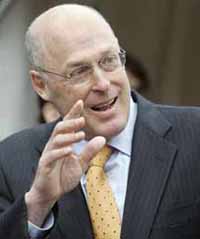Paulson warns against sanctioning China, calls for dialogue
U.S. Treasury Secretary Henry Paulson warned against sanctioning Beijing over trade disputes and called for more dialogue in an interview published Wednesday by a state news agency media as he prepared to meet President Hu Jintao.

Paulson was in Beijing on a visit aimed at defusing U.S. congressional pressure to punish China. Beijing has offered no concessions, but Paulson was expected to use the trip to show that a long-running "strategic economic dialogue" is making progress.
"Legislation is not the proper way to proceed and deal with the currency issue," the Xinhua News Agency quoted Paulson as saying in an interview. "I believe it is much more productive to have bilateral talks and engagement."
Paulson joined in a letter Tuesday to congressional leaders arguing that proposed measures aimed at pressuring China to ease currency controls could undermine efforts to lobby Beijing for changes.
Xinhua said Paulson was responding to criticism by some American lawmakers that the dialogue launched in December has failed to produce results.
Paulson met Tuesday with Vice Premier Wu Yi, who said Beijing was making progress on reforms but was constrained by poverty.
A key irritant in U.S.-Chinese trade relations is complaints that Beijing keeps its currency, the yuan, undervalued, giving its exporters an unfair price advantage and adding to its multibillion-dollar trade surplus.
Paulson said that in his meeting with Wu, "I emphasized (the need) for greater currency flexibility," according to Xinhua.
The secretary was due to meet Wednesday with Hu before returning to Washington. Paulson hopes to show Beijing is moving more quickly to implement reforms meant to narrow the United States' trade deficit with China, which reached a record US$235 billion last year.
The last dialogue meeting in May ended with minor agreements but no progress on the currency issue.
China revalued the yuan by 2.1 percent against the U.S. dollar in July 2005 and has allowed it to rise by about 7.2 percent since then. The rate of increase has speeded up in recent months, but analysts expect Beijing to restrain the yuan's rise to about 5 percent annually over the next few years - far less than critics want.
Chinese leaders say they plan eventually to let the yuan trade freely on world markets. But they say acting too abruptly will hurt China's frail banks and cause financial turmoil.
Paulson, a former Goldman Sachs chief executive, has pleaded with Congress for time to let the dialogue to work. But China's supercharged growth is fueling arguments that it can afford to move faster.
China's economy expanded 11.9 percent last quarter - the fastest quarterly growth in 12 years - and the trade surplus jumped by 85 percent in June to US$26.9 billion (EUR 19.8 billion).
Subscribe to Pravda.Ru Telegram channel, Facebook, RSS!





